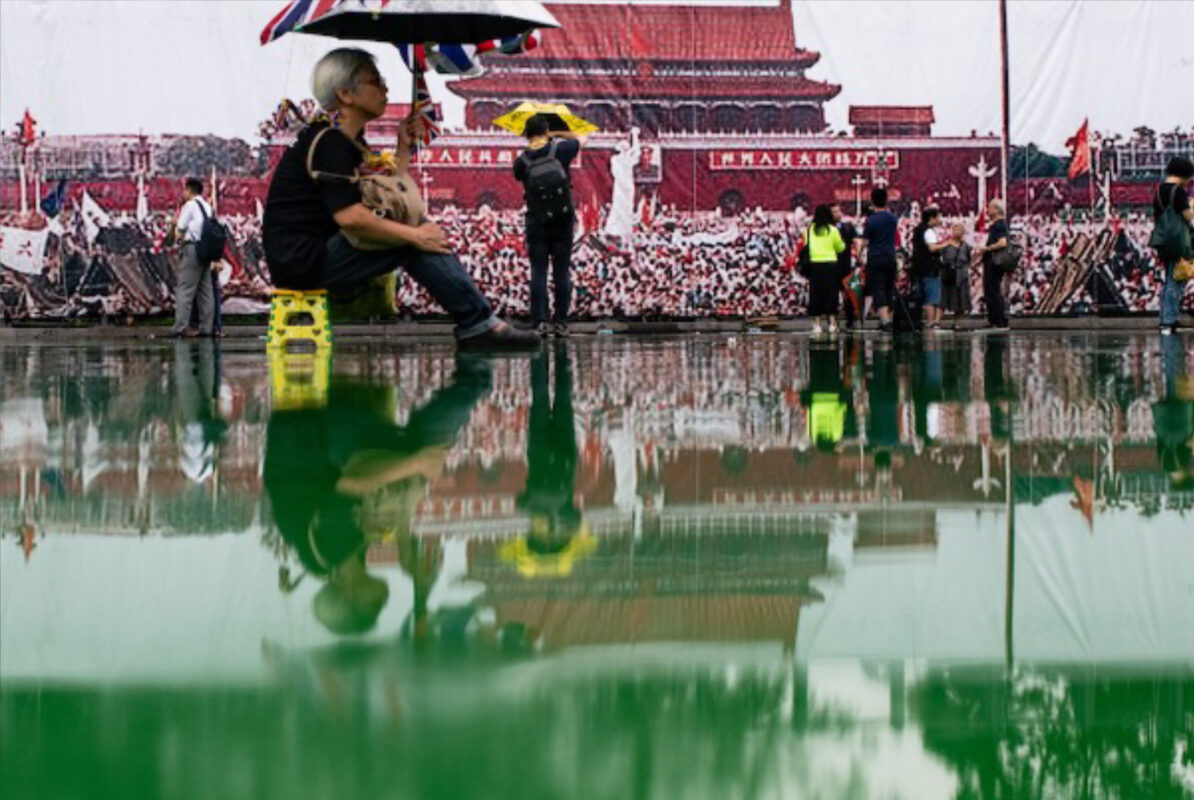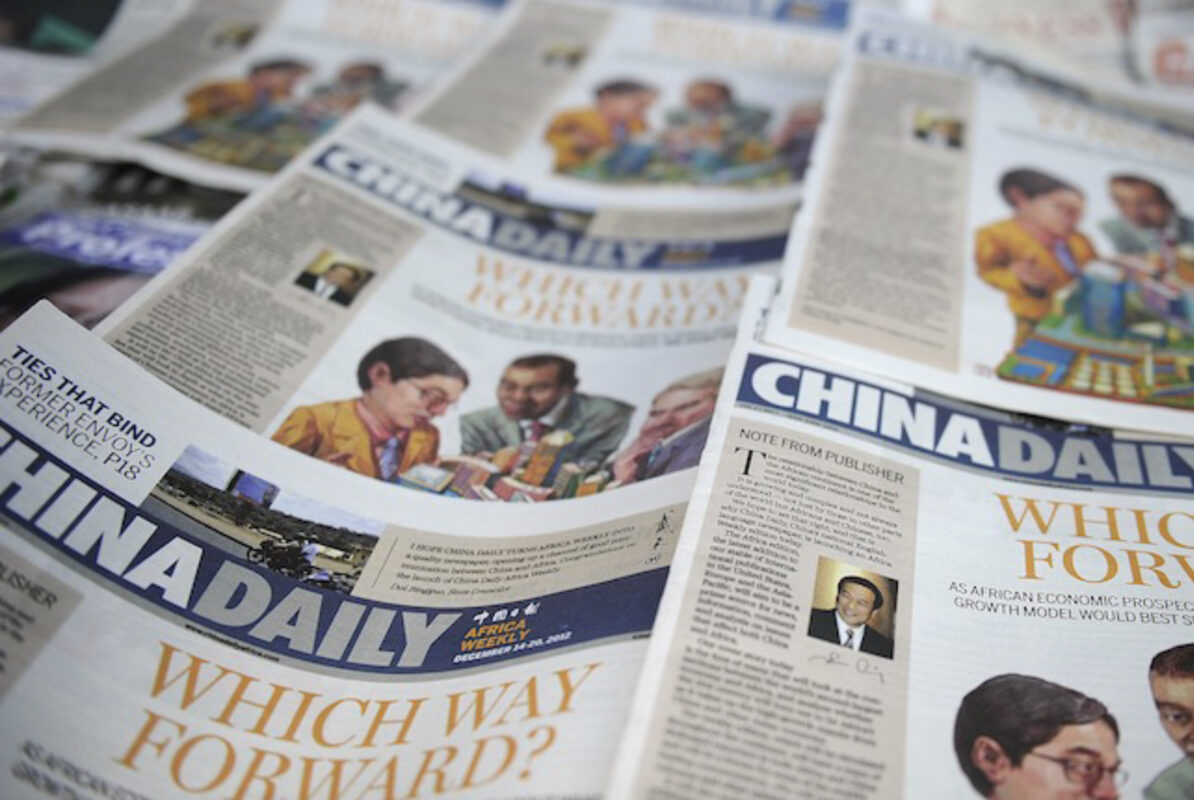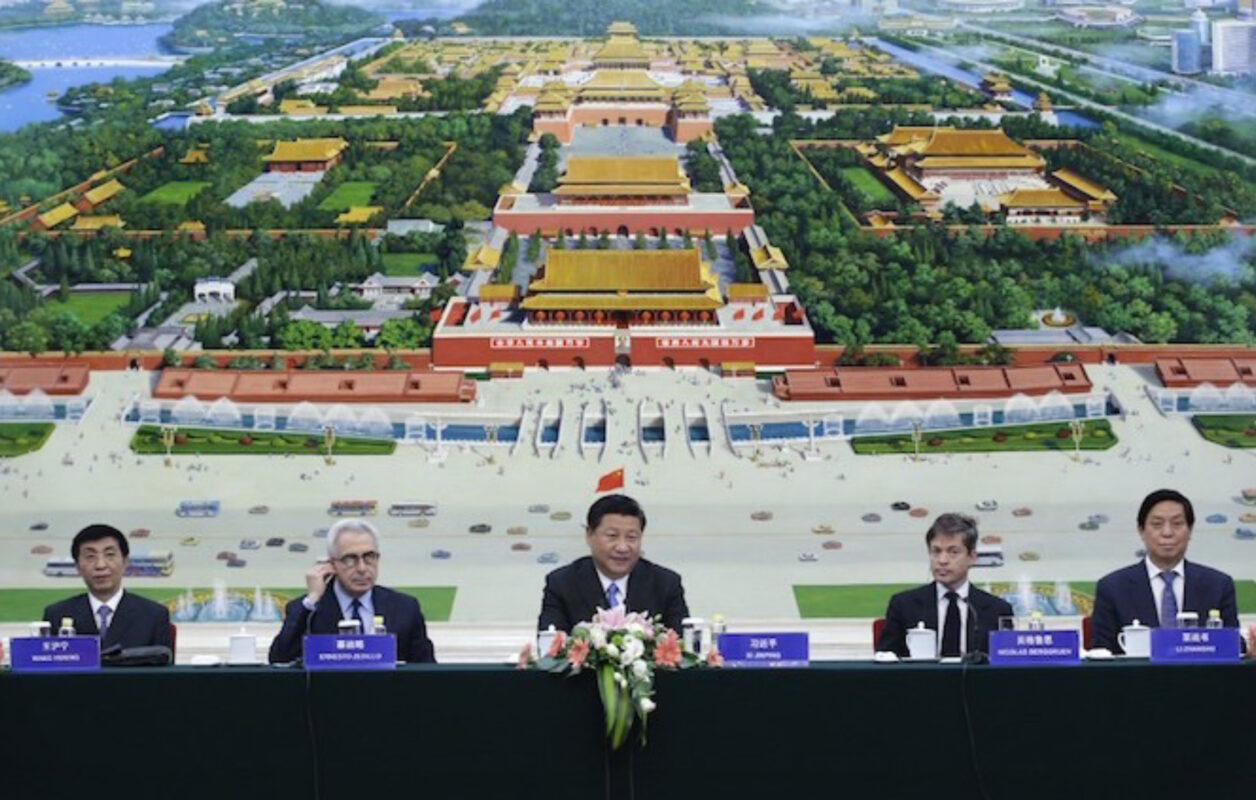CHINA
The big business of self-censorship over China
Self-censorship by media giants dependent on Chinese revenue is giving the Communist Party an easy ride
Anders Corr
China
June 19, 2019

A woman holds an umbrella bearing a British flag in front of a backdrop of Tiananmen Square before a vigil in Hong Kong on June 4 to mark the 30th anniversary of the 1989 Tiananmen crackdown in Beijing. China used its growing media influence to restrict coverage of the anniversary. (Photo by Philip Fong/AFP)
June 4 was the anniversary of the Tiananmen Square massacre in China when, in 1989, People’s Liberation Army tanks and soldiers gunned down and crushed between hundreds and thousands of democracy protesters.
But hundreds of thousands of financial services professionals in China and elsewhere were not reminded of this awkward history on their Eikon terminals, which normally ingest and output all news feeds from Reuters. Instead, Refinitiv, the U.S. intermediary company that provides such data, censored it to comply with Beijing. It supposedly tried to censor the information in China only, but “many users outside of China said they could not see the stories,”reported Reuters. The self-censorship by the Blackstone-backed company was reported on June 3.
This was among the latest news in a swell of dense Chinese influence networks shaping global media environments.
Leading media outlets like The New York Times, Washington Post, Financial Times, Wall Street Journal, Bloomberg, Forbes, Telegraph, Associated Press (AP) and Google have links, directly or indirectly, to China-linked entities that arguably bias their operations — for example, through advertising, business and partnering deals that provide revenues, data, personal networks or market access to China.
While influenced media outlets are likely to deny, minimize or be unaware of such bias when confronted, influence on the media is greater than the sum of its parts, and it can act environmentally and subtly on reporters who seek to climb organizational hierarchies in which sensitive topics, especially those that affect their company’s revenue streams, are avoided. Reporters who ignore such unspoken subtleties sometimes lose their jobs.
表單的頂端
表單的底部
In 2013, for example, Bloomberg suspended Michael Forsythe, allegedly due to the company’s fears that an unpublished investigative article he wrote on links between a Chinese tycoon and top Communist Party officials might lead to Bloomberg’s expulsion from China. Bloomberg garners extensive revenues in China from its financial terminals and, according to a source at Bloomberg around this time, its media business did not make significant profits. Bloomberg News is in effect an advertisement for its terminal business, according to the source.
Refinitiv’s Eikon terminal, used by about 300,000 financial professionals including those in China, is a competitor of the Bloomberg terminal. Blackstone leads a group of companies that own 55 percent of Refinitiv. Thomson Reuters owns the remaining 45 percent. Thomson Reuters, a Canadian company, also owns Reuters news agency.
Since 2007, Blackstone has sold at least US$32 billion worth of assets to Chinese buyers. While the president of Reuters news reportedly expressed concern to Refinitiv, the internal memo was unpublished and therefore appears to be a pro-forma gesture. Both Thomson Reuters and Blackstone would lose substantial revenue if the Eikon terminal were to be excluded from the Chinese market, and so it strains credulity that either would really want Refinitiv to stand on principle at the expense of revenues, when it comes to freedom of information in China.
The links and parallels between Bloomberg, Thomson Reuters and Blackstone are only part of China’s subtle and not so subtle influence in the media.
China’s state-controlled China Daily has purchased large quantities of advertising in 30 or more foreign newspapers, including The Wall Street Journal, New York Times, Washington Post, Los Angeles Times, Seattle Times, Des Moines Register, Le Figaro, El Pais, Sydney Morning Herald and Mainichi Shimbun.
China Daily reportedly spends £750,000 (US$952,000) annually for inserts in the U.K.’s Daily Telegraph alone and spent over US$20 million in the U.S. between 2017 and 2018.

Copies of the Africa edition of the China Daily sit on a news stand in Kenyan capital Nairobi in this file image taken on Dec. 14, 2012. (Photo by AFP /Tony Karumba)
Using companies to influence political processes
Financial services company UBS, which manages extensive investments in China, has contracted with The Wall Street Journal for what appears on Google as a “Paid Program: Fast & Forward” at the URL “Invest-in-China.” It promotes China as an investment destination despite China’s current economic turbulence.
In the context of the U.S. government’s attempts to exclude Huawei from U.S. technology in late May and early June, the Chinese government threatened to develop a blacklist of uncooperative foreign technology companies. They summoned several of the majors, including Microsoft and Samsung, and reportedly warned them about consequences if they discontinue supplies to China despite the new U.S. policies. This puts them in potential legal jeopardy between the extraterritorial and political aspects of the two competing superpowers’ legal systems.
China seeks not only technology but to use technology companies to influence the political process in order to obtain that technology. According to The New York Times: “The Chinese authorities also hinted that firms should use lobbying to push back against the government’s moves” at the meetings with technology majors. On June 6, The Financial Times reported that Google was indeed lobbying U.S. government officials for an exemption to the Huawei ban.
NPR characterized Google as a quiet “Huawei emissary,” based on comments by a senior Huawei official. “Google is a very responsible company. We have maintained very good cooperation with each other,” said Huawei chairman Liang Hua. “We really look forward to productive results from the communication that Google is currently having with the Commerce Department.”
Would Huawei seek to use Google to ban news about Tiananmen on Huawei phones sent abroad if it could? The answer is, most likely, yes.
Google has a news service and bans not only ads for VPNs but more recently has rejected ads by VPN software reviewers in China. A diminishment of VPN access for Chinese news consumers will drastically reduce their ability to access media websites not approved by the CCP.
The CCP allegedly works with the Berggruen Institute, which partnered with the Huffington Post and Washington Post to publish material under the WorldPost brand. These articles are typically sympathetic to China. Included on the The WorldPost Advisory Council is Zheng Bijian, who is a CCP member and longtime adviser to the party’s leadership.
In November, AP signed an MOU with Xinhua, another state-controlled Chinese media outlet. The companies have not made a copy of the agreement public. The U.S. government alleges that Xinhua carries out an intelligence function for China, and in 2018 the U.S. required Xinhua and China’s CGTN to register as foreign agents for their propaganda activities. Xinhua is expanding and localizing their coverage. To maximize the quality of their messaging, they hire local reporters and hosts, print and broadcast on local channels, and seek to have 200 foreign news bureaus by 2020.
Fourteen U.S. Congress members in a December letter asked whether a copy of the November MOU would be released, what guards there would be to stop Xinhua from influencing AP reporting, and whether Xinhua staff would have access to any sensitive AP information.
Engagement
Stephen Schwarzman, chief executive of Blackstone, is a member of the Berggruen Institute and supports organizations with a sympathetic viewpoint of China, such as the Asia Society, Tsinghua University and his own Schwarzman Scholars. Daniel Bell is the chair professor of the Schwarzman Scholars Program at Tsinghua University while also being director of the Berggruen Institute of Philosophy and Culture. Bell is one of the most famous of authors sympathetic to China. His book, The China Model: Political Meritocracy and the Limits of Democracy, argues that the Chinese political system of meritocracy can remedy the flaws of democracy.
Schwarzman and fellow billionaire Maurice Greenberg (chief executive of C.V. Starr & Co.) have both supported, in material or immaterial ways, the China General Chamber of Commerce (CGCC) in New York, which is led by the Bank of China’s New York president. CGCC in New York collaborates with both Michael Bloomberg and his company on international investment conferences.
China’s conglomerate HNA also engages with the CGCC, whose U.S. foundation funded the National Committee on U.S.-China Relations (NCUSCR) studies conducted by Rhodium Group on Chinese investment in the United States by congressional district. NCUSCR studies on U.S.-China foreign direct investment have been sympathetic to China and were widely and largely uncritically reported by the international media. The Wall Street Journal, New York Times, Financial Times, CNN, Bloomberg, Los Angeles Times, CNBC and the BBC reported on the studies.

China’s President Xi Jinping (center), Mexico’s former President Ernesto Zedillo (2nd left) and Nicolas Berggruen (2nd right), who is the chairman of the Nicolas Berggruen Institute, attend a meeting of the second Understanding China Conference in Beijing on Nov. 3, 2015. (Photo by Jason Lee/AFP)
One media company with increasingly favorable coverage of China is Forbes, now majority-owned by a shadowy Hong Kong company called, of all things, Integrated Whale Media. The company peremptorily cut an article critical of a dual national (U.S. and Hong Kong) billionaire named Ronnie Chan, who according to a source had contact just beforehand with the Forbes employee who was instrumental in deleting the article. After the author alleged censorship on Facebook, his contract was terminated. (Full disclosure: I was the author).
According to another source, editor Steve Forbes was shortly afterwards seen at an Asia Society event seated next to Chan. Several Forbes writers who previously wrote critically of China, including Gordon Chang and Claudia Rosett, had their Forbes contracts cancelled shortly afterwards.
Chan reportedly attended a 2014 Beijing meeting with Xi Jinping with 70 other business and political leaders, including 15 members of the Chinese People’s Political Consultative Conference. His inclusion signaled his close and positive relationship with the CCP. Analysts noted that at the meeting, President Xi did not use the phrases “Hong Kong people ruling Hong Kong” and “high degree of autonomy,” as were used by former president Hu Jintao at a similar meeting in 2003.
As should be clear from the Forbes case, the CCP and its associates brandish the stick as ably as the carrot. The Hong Kong government, for example, denied a work visa to a Financial Times reporter in 2018, putting pressure on future reporters in the city to moderate their published views. The reporter, effectively expelled, had represented the city’s press club.
Michael Cole, another hard-hitting journalist on China, was sued by Patrick Ho and the China Energy Fund Committee (CEFC). Ho is a former Hong Kong politician and head of the CEFC think tank. He is now in prison in the U.S. for seven counts of bribery and money laundering related to attempts to obtain business advantages for CEFC China from African leaders he met at the U.N. Ho is appealing the decision. In 2018, prosecutors claimed that they had evidence of Ho offering a bribe to former U.N. General Assembly president John Ashe, who died under suspicious circumstances before he was able to testify at another corruption trial involving a Chinese national.
According to Cole: “I was sued in a Taiwanese court in 2017 over an article I wrote about them in March 2015, but they lost in February 2018. Among other things, they had insisted that my article, which appeared in The National Interest, be deleted.”
Authors Martin Hala and Mark Stokes, who also examine Chinese influence in European and U.S. politics, have likewise been threatened with lawsuits by CEFC. They were not taken to court but according to Hala: “The notorious Chinese company CEFC threatened to sue not us directly, but our publishing partners in 2016. For about two months, I couldn’t get anything published, before it became clear it was all nonsense.”
In February, Australian businessman Chau Chak Wing won legal costs plus $280,000 in defamation damages from Fairfax Media for an article by a colleague of Cole’s, Hala’s and Stokes’ named John Garnaut. Chau was allegedly defamed for suggestions that he was involved in a conspiracy to bribe the U.N.’s John Ashe. Fairfax Media is appealing the decision.
Professor Anne Marie Brady, who writes on Chinese influence at the University of Canterbury in New Zealand, had her computer burgled from her home in 2018. It was an old computer and only valuable because of the data it contained. Other valuables were left behind. Her front tires were also purposefully deflated in a likely act of sabotage. Analysts are pointing fingers at China.
This month, retired Brigadier General Robert Spalding, who now focuses on defending a future U.S. 5G infrastructure from Chinese technology, had his personal computer hacked. He says that all files were put in the recycle bin, and that the culprit was probably China.
This author has not been immune to legal and death threats, having received one legal threat in 2014 related to anarticle on corruption in Ukraine, and several death threats, one of which was investigated by U.S. law enforcement.
An earlier version of this article, published on another platform on June 13, was removed after the editor-in-chief of the WorldPost, Nathan Gardels, sent an email the same day that read, “your insinuations about The WorldPost in a recent … article are incorrect and we insist you retract them or face legal action.”
The original paragraph on the Berggruen Institute and The WorldPost remains unchanged in this version of the article. Gardels has a long list of accomplishments stretching back to 1983, several of which are linked to Russia and China. He is a senior adviser to the Berggruen Institute, which has invested US$25.5 million to establish theBerggruen China Center at Peking University.
Carrots and sticks
Legal threats, burglaries, hacking and sabotage against authors trying to uncover Chinese influence operations have a chilling effect on investigative reporting that focuses on people and organizations who are backed by extensive resources, leading to a bias in the media against such coverage. It also leads to a bias against fair investigation into matters of importance and risk to democracies, namely whether authoritarian regimes are stealthily using wealth and power to influence democratic decision-making processes.
While the Western media is thought to be highly critical of China, would they be even tougher without this dense network of links to the CCP and corporations that depend on China? Without all the carrots and sticks, would analysts provide more transparency into Chinese influence operations, and would our public think differently about China, and thus demand more from elected leaders?
Truly independent media, including small newspapers and bloggers, are increasingly important to keeping in check the world’s most powerful organizations. This applies above all to the CCP and its many corporate and media associates.
Better legal protections for investigative journalism and scholarship, and legislating against Chinese influence campaigns, recognized and unrecognized, would not be costly and would surely achieve a more independent media, even if they don’t like to admit as much. We owe that, at least, to those who fell at Tiananmen for freedom and democracy on June 4, 1989. We require that, if we want to successfully bequeath freedom to the future.
Anders Corr holds a Ph.D. in government from Harvard University and has worked for U.S. military intelligence as a civilian, including on China and Central Asia.
The views and opinions expressed in this article are those of the author and do not necessarily reflect the official editorial position of ucanews.com.


 ENG
ENG